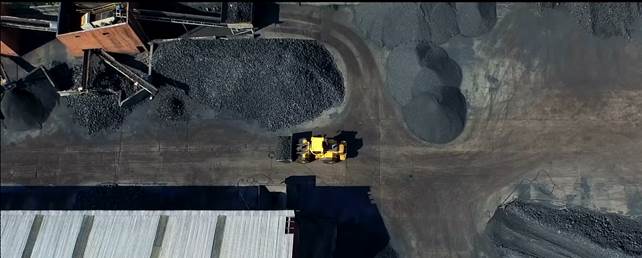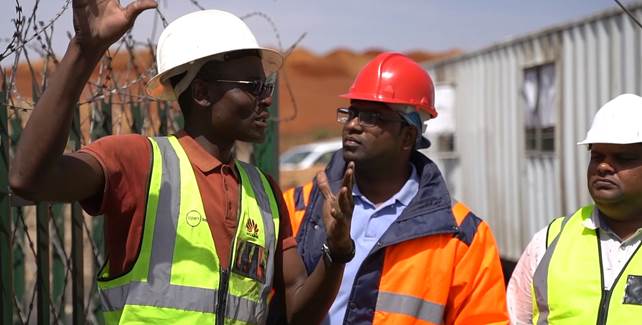Boosting Resource Productivity Through Connectivity: Exxaro Partners with Huawei to Upgrade its Networks
Exxaro, one of South Africa's largest black-empowered resource companies, includes coal operations and investments in iron ore, pigment manufacturing, renewable energy, and residual base metals. With Huawei, Exxaro upgraded its software-defined WAN (SD-WAN) to improve operation efficiency in the mining area.

In an effort to boost productivity, the company decided to draw up plans to upgrade its corporate network and also deploy a wireless pit network. Such networks, Exxaro believed, would serve as a solid foundation to make significant improvement to its processes, enabling the company to connect its many geographically-dispersed locations, and improve operation efficiency in the mining area.

To support the rapid development of its services, Exxaro's headquarters and 13 sites are purposely situated in South Africa itself. However, the company was still plagued by a range of network issues, weighed down by a complex network architecture that was difficult to manage.
Plainly put, the legacy network was simply too old: it had already been deployed for six to eight years. Many of its devices were outdated and poorly performing. In addition, outdated network equipment was physically large, taking up far too much valuable space in the equipment room.
Making matters worse, Exxaro's existing Network Management Systems (NMSs) and policies were not consistent across wired and wireless networks. And since network devices came from multiple vendors, the Operations and Maintenance (O&M) department needed to manage each system separately to implement policy control — a challenging, time-consuming, and frustrating task.
All was not lost, however, with new technologies such as Software-Defined Wide Area Network (SD-WAN) promising to provide the necessary technical support for the digital transformation of Exxaro's network. And that would be a welcome relief.
"We have moved from traditional mining where coal is mined to a more data mining operation," said Mukesh Soma, Head of Operations at Exxaro. "What I mean is that we now extrapolate information from trunks, shovels, and drills, in the pit as well as the plants, so that information is used to make more informed decisions. We’ve moved to rely more on Software as a Service (SaaS)-based solutions on the cloud, which is much more flexible and allows us to do much more analytics. Huawei has enabled us to upgrade our Local Area Network (LAN), initially to a 10 GE backbone. They’ve also introduced SD-WAN, which allows us to be more robust in terms of our Internet connectivity."
After carrying out an in-depth analysis of Exxaro’s major pain points and campus network application scenarios, Huawei proposed its SD-WAN Branch Solution for the company's headquarters and Huawei's Agile Campus Network Solution for its 13 sites.
The Agile Campus Solution allows campus networks to achieve efficient and secure connections between people and people, people and devices, devices and devices, and wired and wireless networks, in turn supporting the adoption of the Internet of Things (IoT) and all the concomitant value that will bring. The use of standard 1U switches saves valuable space in the equipment room as well as reducing power consumption. Meanwhile, the Network Access Control (NAC) function of Huawei's Agile Controller — a user- and application-based network resource auto control system — implements unified policy deployment across wired and wireless networks. Elsewhere, Huawei's eSight — a unified NMS — simplifies the management of switches, Access Points (APs), and SD-WAN Customer-Premises Equipment (CPE) devices.
The SD-WAN Branch Solution implements on-demand interconnection between the headquarters and branches, as well as between branches and branches. The Solution's intelligent traffic-steering and link aggregation functions also help Exxaro cut down their Operating Expense (OPEX).
Both solutions feature plug-and-play devices across the entire network, enabling rapid deployment and simplifying O&M for Information Technology (IT) personnel. Meanwhile, visualized management of applications and links, with Geographic Information System (GIS) as an index, provides visibility for the condition of the entire network. This not only accelerates fault location, but also simplifies O&M, pushing down OPEX even further.
Exxaro's network upgrade demanded urgency. After submitting the order, Huawei had just one and a half weeks to deliver the project, including the transportation time from Shenzhen, China, to South Africa. Huawei rose to the challenge and completed the migration of the LAN and Wireless Local Area Network (WLAN) on time — all while ensuring zero service interruptions during implementation.
Wireless coverage has now increased by 30%, and network speeds have been boosted from 54 Mbit/s to 1.3 Gbit/s. Simplified network architecture and plug-and-play devices have shortened deployment time from months to just days. This represents a significant improvement over traditional enterprise private lines, which typically require several months to undergo in-store application, service commissioning, and onsite configuration. In terms of O&M, Huawei's Agile Controller helps Exxaro's IT personnel to easily identify network and application software faults, — with no need to even be onsite — improving efficiency by an astonishing 66%.
Critical to any network's long-term success is service support, post-deployment. The Co-Care support service, jointly developed by Huawei and service partner Tech Mahindra, is designed to achieve exactly that. This service will help to maintain an efficient and stable network environment for Exxaro and its employees, ultimately improving network productivity.
In addition to warranty services, Exxaro also has access to Huawei's Technical Assistance Center (TAC). TAC provides customers and partners with one-stop services and support 24 hours a day, 365 days a year, including help desk access, remote troubleshooting, a spare parts service, onsite support for work order scheduling, pre-sales support, efficient handling of Dead on Arrival (DOA) issues, and customer satisfaction surveys. Such services ensure that Huawei is able to replace vital hardware — from core and distributed switches to SD-WAN products — in the shortest time possible. Additionally, Huawei access switches and wireless APs offer self-protection, and 2% of all devices are reserved for use as spare parts. With its global spare parts operation center located in Shenzhen, Huawei also has nine regional spare parts operation centers, and seven spare parts warehouses in South Africa alone. This means Huawei stands ready to provide the highest quality spare parts services to Exxaro, should the need arise.
The completion of the network upgrade serves as an important milestone in Exxaro's digital transformation journey — but it's just the beginning. And, as such, its success can serve as a model for other multi-branch mineral and energy enterprises to follow.
Click here to explore more industrial digital transformation stories from the Intelligent IP Pioneers webpage.